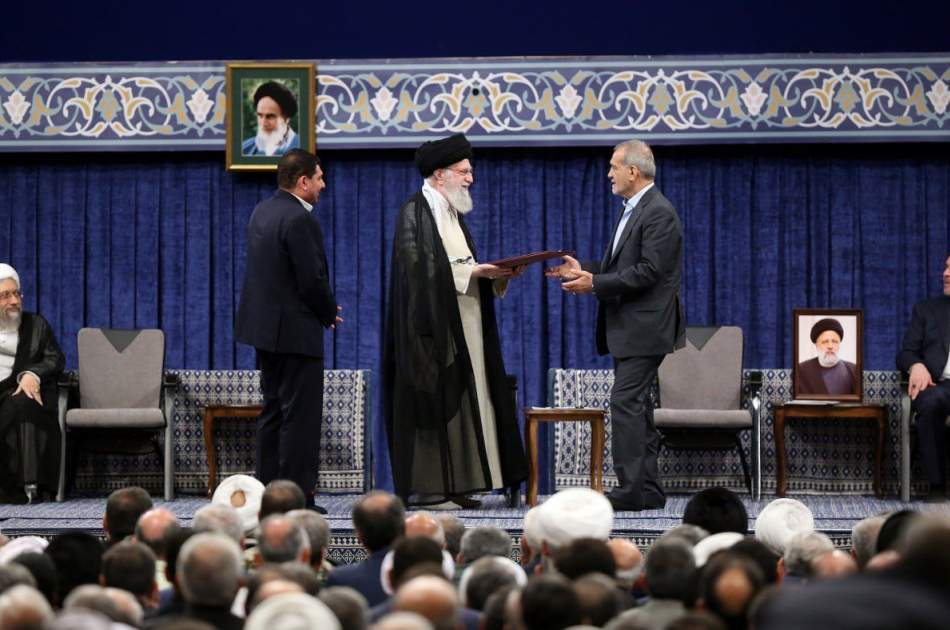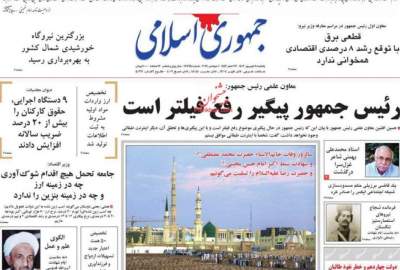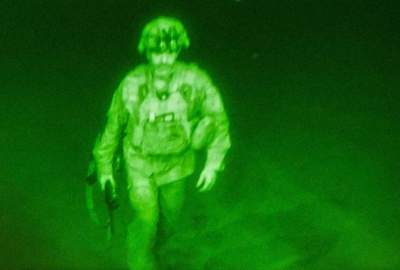Imam Khamenei, the leader of the Islamic Revolution, appointed Dr. Masoud Pezeshkian as the president of the Islamic Republic of Iran, following the vote of the Iranian people in the recent presidential elections.
Publish dateSunday 28 July 2024 - 14:08
Story Code : 294273
Afghan Voice Agency (AVA) - Tehran: In the text of this ruling, it is stated: Thanks to Allah, who once again made Islamic Iran proud and made the face of the great nation shine; The decisive test of the presidential election was completed with the efforts of the people and the officials, in difficult conditions, with calmness and sobriety, and the chosen personality of the nation was ready to fulfill a great responsibility.
In the continuation of this ruling, it is stated: Now, with thanks to all those who played a role in creating this honor, following the great nation, I implement their vote for the wise, honest, popular, and scholarly personality of Mr. Pezeshkian And I appoint him to the presidency of the Islamic Republic of Iran.
At the end of this ruling, the Leader of the Islamic Revolution, with a prayer and sincere wish for the success of Dr. Al-Madikian, reminded that the nation's vote and his implementation will continue as long as the new president's constant policy of following the straight path of Islam and the Islamic Revolution is maintained.
Following the holding of the second round of Iran's presidential elections on Friday, July 25, Masoud Pezeshkian was officially elected by the people as the new president of the country by winning more votes and overtaking Saeed Jalili. According to the counting of 30 million 530 thousand 157 votes cast into the fund, Masoud Mezikian with 16 million 384 thousand 403 votes and nearly three million more votes than Saeed Jalili with 13 million 538 thousand 179 votes, from the people He was elected as the new president of Iran.
This extraordinary election was held following the martyrdom of Ayatollah Seyed Ebrahim Raisi, the late president of the Islamic Republic of Iran, and his accompanying delegation in a helicopter crash and within 40 days of this event.
At the same time, Ahmad Vahidi, the Minister of Interior of Iran, stated in the inauguration ceremony of the 14th term of the Islamic Republic of Iran: The 13th government and the Ministry of Interior were able to implement the general policies of the elections and the strategic lines considered by the leadership, that is, health, participation, competition, security and To implement the election process impartially and faithfully.
He stated: All election processes were well monitored. More than 61 million people were eligible to vote, of which more than 24,500,000 votes were cast in the first stage, and more than 30,500,000 votes were cast in the second stage, which resulted in 49.8% participation in the second stage.
He called political calm, security of elections, impartial holding of elections, implementation of advertisements in a moral atmosphere, accuracy and accuracy of election implementation, public information, increase of 25% of voters in the second phase as the characteristics of these elections.
At the end, the Minister of Interior of Iran thanked the institutions involved in holding the elections and said: I would like to express my special thanks to the leadership of the Islamic Revolution. When everyone was saddened by the martyrdom of the president, your orders and guidelines and your steadfastness and the epic presence of the people once again showed the glory of religious democracy and the steadfastness of the system.
But regarding the nature and definition of the enforcement order, in the Islamic Republic of Iran, the president is the head of the country, the leader and the head of the executive branch, and without the enforcement of the leadership, the president is not allowed to take office.
The ninth paragraph of the one hundred and tenth article of the Iranian constitution, which is related to the duties and powers of the leadership, speaks of the signing of the presidential decree after the election of the people by the leader, which actually refers to the concept of formalizing and enforcing the "presidential decree" with the word "enforcement".
In the religious democratic system of the Islamic Republic of Iran, two bases for the legitimacy of the political system are foreseen, one is the popular base and the other is the divine base; that the popular base is provided through the people's election and their vote for the president; But its divine foundation is established through the leadership's enforcement of the people's choice; That is, the basis of divine legitimacy here is enforcement, and with enforcement, a president has divine-popular legitimacy.
When the President of Iran is executed, we reach Article 122 of the Constitution of this country, which states that "the President is responsible to the nation, the leader and the Islamic Council within the limits of the powers and duties assigned to him by the Constitution or ordinary laws"; That is, enforcement gives him legitimacy on the one hand and responsibility on the other hand, and he must be accountable. After being implemented, the president of Iran becomes accountable to the leadership and must fulfill the expectations that the leadership has from the president within the framework of the constitution.
avapress.com/vdcgut9xwak9yx4.5jra.html
Top hits







